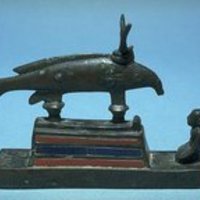Papers by Eftychia Bathrellou
Munere mortis: Studies in Greek literature in memory of Colin Austin, 2022
Note to the reader ix List of contributors xi List of abbreviations xiii Preface xv PART I: Comed... more Note to the reader ix List of contributors xi List of abbreviations xiii Preface xv PART I: Comedy 1. Textual notes on Menander's Dyskolos 3 Antonis K. Petrides 2. From certainty to hypothesis: Menander's Misoumenos 21 Efrosyni Stigka 3. Charisios and the divine in Menander's Epitrepontes 38 Eftychia Bathrellou PART II: Poetry in prose/prose on poetry 4. Socrates orans (Pl. Phdr. 279b8-c3) 65 Nikos G. Charalabopoulos 5. The filter and the magnifier: Plato's and Xenophon's sympotic narratives 97 Andrea Capra 6. Words that chill: ψυχρότης in ancient humour and criticism 115 Richard Hunter PART III: Epigrammatic poetry 7. Marginalia posidippea 141 Valentina Garulli 8. The erotic 'newcomers' of the Sylloge Parisina: a new critical edition and commentary 153 Lucia Floridi
In A. Sommerstein (ed.), The Encyclopedia of Greek Comedy, Wiley-Blackwell, 2019

It has well been recognized by scholars as a major feature of the construction of Epitrepontes th... more It has well been recognized by scholars as a major feature of the construction of Epitrepontes that, until Charisios' appearance on stage in Act IV, the audience is continuously constructing and revising its understanding and reactions to him through the reports and comments of other characters. 6 The text and attribution of 693-701, in particular the reference to Habrotonon's introduction to Charisios' house at 697-98, are, then, signifi cant for the audience's evaluation of Charisios: Is Charisios presented at 697-98 as about to introduce Habrotonon to the same house as his wife, as the text of 697 preferred by almost all scholars and printed above implies ("her he will keep, and he will take and introduce the other one immediately to his house -it's clear")? Or do these two lines refer only to Habrotonon and include no mention of Pamphile, as in the text of Austin 1 , 14: αὐτ [ὴν] μὲν ἕξε[ι] τήνδ᾿· ἐπ[ει]σάξει λαβών … ("This very woman he will havehe will take and introduce her …")? And is Habrotonon's introduction to Charisios' house an outrageous scenario imagined by the extremely angry Smikrines, which, hence, need not refl ect on Charisios? Or are these lines uttered by Charisios' friend Chairestratos, at whose house Charisios has been staying and who could, hence, have been perceived by the audience as a reliable source? However, the text and, especially, the attribution of 697-98 remain a disputed matter.
Book reviews by Eftychia Bathrellou
Books by Eftychia Bathrellou

Colin Austin (1941–2010), Professor of Greek at Cambridge and distinguished editor of poetic text... more Colin Austin (1941–2010), Professor of Greek at Cambridge and distinguished editor of poetic texts, was renowned for the precision and brilliance of his scholarship. This collection of studies, offered by some of his pupils, aims to honour his memory. The papers combine philology and textual criticism with a strong interest in setting the works under examination in their literary and cultural context. Individual contributions are devoted to the establishment of the text of Menander and Posidippus, while one chapter offers a new critical edition and commentary on the erotic epigrams preserved only in the Sylloge Parisina. Other essays explore poetic, performative and narratological features in the Phaedrus and in Plato’s and Xenophon’s Symposium. The volume also includes an analysis of pathetic fallacy in the Epitaph for Bion and a study of the concept of ‘frigidity’ in ancient literary criticism.
Papers by: Eftychia Bathrellou, Andrea Capra, Nikos Charalabopoulos, Margherita Maria Di Nino, Lucia Floridi, Richard Hunter, Valentina Garulli, Antonis Petrides and Efrosyne Stigka.
Editors: Eftychia Bathrellou and Margherita Maria Di Nino.

Wiley Blackwell, 2022
Slavery was foundational to Greek and Roman societies, affecting nearly all of their economic, so... more Slavery was foundational to Greek and Roman societies, affecting nearly all of their economic, social, political, and cultural practices. Greek and Roman Slaveries offers a rich collection of literary, epigraphic, papyrological, and archaeological sources, including many unfamiliar ones. This sourcebook ranges chronologically from the archaic period to late antiquity, covering the whole of the Mediterranean, the Near East, and temperate Europe.
Readers will find an interactive and user-friendly engagement with past scholarship and new research agendas that focuses particularly on the agency of ancient slaves, the processes in which slavery was inscribed, the changing history of slavery in antiquity, and the comparative study of ancient slaveries.
Perfect for undergraduate and graduate students taking courses on ancient slavery, as well as courses on slavery more generally, this sourcebook’s questions, cross-references, and bibliographies encourage an analytical and interactive approach to the various economic, social, and political processes and contexts in which slavery was employed while acknowledging the agency of enslaved persons.
Πανεπιστημιακές Εκδόσεις Κρήτης, 2020
Η συλλογή κειμένων που συγκροτεί τον τόμο παρουσιάζει ιστορίες από την καθημερινή ζωή των δούλων ... more Η συλλογή κειμένων που συγκροτεί τον τόμο παρουσιάζει ιστορίες από την καθημερινή ζωή των δούλων στην αρχαιότητα. Με τη μεγάλη της ποικιλία δίνει στους αναγνώστες την ευκαιρία να ξεφύγουν από μια αφηρημένη και γενική αντίληψη της δουλείας και να έρθουν σε επαφή με τις εμπειρίες και τις τύχες συγκεκριμένων δούλων. Οι επιλεγμένες αφηγήσεις είναι αναμφίβολα γοητευτικές· αλλά εικονογραφούν ταυτοχρόνως με παραδείγματα την καταπίεση, την εκμετάλλευση αλλά και την αντίσταση στον θεσμό της δουλείας.










Uploads
Papers by Eftychia Bathrellou
Book reviews by Eftychia Bathrellou
Books by Eftychia Bathrellou
Papers by: Eftychia Bathrellou, Andrea Capra, Nikos Charalabopoulos, Margherita Maria Di Nino, Lucia Floridi, Richard Hunter, Valentina Garulli, Antonis Petrides and Efrosyne Stigka.
Editors: Eftychia Bathrellou and Margherita Maria Di Nino.
Readers will find an interactive and user-friendly engagement with past scholarship and new research agendas that focuses particularly on the agency of ancient slaves, the processes in which slavery was inscribed, the changing history of slavery in antiquity, and the comparative study of ancient slaveries.
Perfect for undergraduate and graduate students taking courses on ancient slavery, as well as courses on slavery more generally, this sourcebook’s questions, cross-references, and bibliographies encourage an analytical and interactive approach to the various economic, social, and political processes and contexts in which slavery was employed while acknowledging the agency of enslaved persons.
Papers by: Eftychia Bathrellou, Andrea Capra, Nikos Charalabopoulos, Margherita Maria Di Nino, Lucia Floridi, Richard Hunter, Valentina Garulli, Antonis Petrides and Efrosyne Stigka.
Editors: Eftychia Bathrellou and Margherita Maria Di Nino.
Readers will find an interactive and user-friendly engagement with past scholarship and new research agendas that focuses particularly on the agency of ancient slaves, the processes in which slavery was inscribed, the changing history of slavery in antiquity, and the comparative study of ancient slaveries.
Perfect for undergraduate and graduate students taking courses on ancient slavery, as well as courses on slavery more generally, this sourcebook’s questions, cross-references, and bibliographies encourage an analytical and interactive approach to the various economic, social, and political processes and contexts in which slavery was employed while acknowledging the agency of enslaved persons.